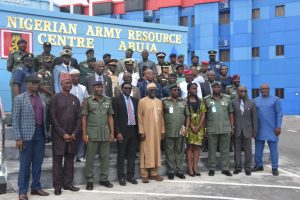SECURITY
Peacekeeping: Army chief harps on civilian protection in arms conflict

The Chief of Army Staff, Lt.-Gen. Faruk Yahaya, has called for concerted effort in ensuring protection of civilians during arms conflicts through peace support operations.
Yahaya, who was represented by the Chief of Training (Army), Maj. -Gen. Musa Etsu-Ndagi, said this at the inauguration of the Protection of Civilian Course 2023, on Monday in Abuja.
The 2-Weeks course was organised by the Martin Luther Agwai International Leadership and Peacekeeping Centre (MLAILPKC) in partnership with UNDP and Government of Japan for participants from Nigeria and some ECOWAS countries.
The COAS said that conflicts in the 21st century were becoming more complex in nature, hence the need for holistic approaches, evolving both kinetic and non kinetic means for conflict prevention as well as protection of lives and property.
He said the course was conceived by the UN Security Council to forestall the past experiences of genocides and mass murders in some conflicts.
“So as to ensure the pro-activeness of peacekeepers in the aspects of protection of civilians in all peace support operations.
The course is vital in building the capacity of participants to compliment the efforts in building capacity to protect unarmed civilians, including women and children in multidimensional peace, support operations environment.”
According to him, it will also facilitate the return of peace, security and normalcy in conflicted societies and environments.
“This course will aid you to understand activities of non-governmental organisations and other mission partners in the protection of civilians, thus creating synergy and seamless operations, while working with other peace support operation mission partners,” he said.
The Commandant, MLAILPKC, Maj.-Gen. Emmanuel Udiandye, said contemporary dynamics of conflict had necessitated good peace support operations with special focus on the protection of civilians.
Udiandye said the UN Security Council had since 1999, added the protection of civilians in armed conflict to its agenda, thereby formally recognising it as a matter of international peace and security.
He said the UNSC resolutions 1265 had enhanced compliance with applicable international laws and relevant decisions in the conduct of hostilities.
The aim, according to him, is to facilitate access to humanitarian assistance, protect possibly displaced persons, particularly women and children during hostilities, respond to violations through targeted measures, as well as promote accountability of the process.
He said the course would focus on social, political, religious, economic, environmental and humanitarian factors in support of African peacekeepers and indeed world Peacekeepers in multidimensional peace operations.
“The course, which is a response to the wakeup call by the UN on the need to forestall the experiences of genocide and most murders in conflict areas, as was the case in Rwanda as well as the international organizations
“To ensure that activeness of peacekeepers in the aspect of protection of civilians in all peace support operations is undertaken.
“It was necessitated and designed to be in line with the UN program of improving protection of civilian amongst peacekeepers.
“The course will therefore expose the participants to improved cordial relations with crosscutting actors and help to enhance existing understanding in carrying out your duties during the two weeks course,” he said.
The former Chief of Defence Staff and Chairman, Governing Council of MLAILPKC, retired Gen. Martin Luther Agwai, said that conflicts had become more dynamic because of several factors.
Agwai said that the military, who were equipped to restore peace and security, had the responsibility of ensuring that unarmed civilians in conflict areas were protected.
He said the first set of casualties in any conflict were women and children, and advocated increased involvement of women in peace support operations.
He urged participants to take advantage of the course to equip themselves with the requisite capacity to protect civilians in during arm conflicts.
Our correspondent reports that the participants were drawn from the armed forces of Nigeria and other ECOWAS member countries.
The participating countries include the Gambia, Mali, Cameroon, Nigeria, Niger, Benin Republic and Sierra Leone.




 Davido's Net Worth & Lifestyle
Davido's Net Worth & Lifestyle 
